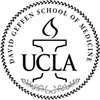Learning Objectives for Required Clerkships
Upon completion of the required clerkships, it is expected that the student will be able to demonstrate:
1. the ability to take an accurate, focused patient history, including psychosocial and family issues;
2. the ability to perform a complete or focused physical and psychiatric examination;
3. the ability to give a complete, accurate and organized case presentation;
4. the ability to keep a complete, accurate, organized medical record;
5. knowledge of common acute and chronic problems across age and gender;
6. a basic knowledge of gender and age-specific preventive health measures;
7. interpersonal skills that enable the development of patient rapport;
8. the ability to use evidence-based medicine to solve clinical problems;
9. knowledge of appropriate use of imaging modalities, including conventional radiography, ultrasound, CT or MR imaging;
10. the ability to formulate a patient-centered management plan that incorporates the principles of prevention and health education;
11. knowledge of and sensitivity to cultural and socioeconomic issues that impact patient care;
12. knowledge and skills needed to provide cost-effective and appropriate care;
13. skills in life-long learning, including skills to search computerized medical databases;
14. the ability to utilize other members of the health care team, including consultant physicians, nurse practitioners, nutritionists, and mental health professionals.
These policy guidelines have been compiled by the Clerkship Course Chairs’ Subcommittee of the Medical Education Committee in an effort to inform students as to expectations about their performance on clinical clerkships. These guidelines apply to all of the required clerkships at all clinical sites.
